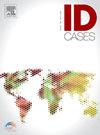Dengue in older inpatients in the post-COVID-19 Period: a case series from a North Indian tertiary center
IF 1
Q4 INFECTIOUS DISEASES
引用次数: 0
Abstract
Studies on dengue in older patients are scarce from India. The patterns of dengue in the post-COVID-19 period have been poorly studied globally. Our case series describes the patterns and outcomes of dengue in inpatients of the geriatric unit of a tertiary university hospital in North India during the period of August -December 2023. Twenty-four patients were diagnosed with dengue out of 182 admissions during the study period (13.2 %). The median (Q1-Q3) age of patients was 67.5 (64.75–75) years. Fever was present in all except one patient (95.8 %). Weakness, vomiting, dyspnea, and altered sensorium occurred in 41.7 %, 37.5 %, 29.2 %, and 20.8 %, respectively. Hyponatremia, thrombocytopenia, and anemia were observed in 58.3 %, 45.8 %, and 25 % of cases, and nearly one-third developed hepatitis. Leucopenia rates were relatively low. Dengue was severe in two-thirds, and acute kidney injury was the commonest complication. Three fatalities were observed. In summary, many older patients had atypical presentations of dengue, and the disease was severe in a significant proportion. Larger multi-centric surveillance studies with the inclusion of immunogenic correlates of COVID-19 are needed to understand its effects if any on the age and region-specific variations of dengue in the elderly.
covid -19后时期老年住院患者中的登革热:来自北印度三级中心的病例系列
在印度,关于老年登革热患者的研究很少。在全球范围内,对covid -19后时期登革热的模式研究甚少。我们的病例系列描述了2023年8月至12月期间印度北部一家三级大学医院老年科住院患者登革热的模式和结果。在研究期间,182名入院患者中有24名被诊断为登革热(13.2% %)。患者的中位(Q1-Q3)年龄为67.5岁(64.75-75)岁。除1例患者(95.8% %)外,其余患者均有发热。虚弱、呕吐、呼吸困难和感觉改变分别发生在41.7% %、37.5% %、29.2% %和20.8% %。58.3% %、45.8% %和25% %的患者出现低钠血症、血小板减少症和贫血,近三分之一的患者出现肝炎。白细胞减少率相对较低。三分之二的患者重症登革热,急性肾损伤是最常见的并发症。有3人死亡。总之,许多老年患者的登革热表现不典型,而且很大一部分患者病情严重。需要开展更大规模的多中心监测研究,纳入COVID-19的免疫原性相关因素,以了解其对老年人登革热的年龄和区域特异性变异的影响。
本文章由计算机程序翻译,如有差异,请以英文原文为准。
求助全文
约1分钟内获得全文
求助全文

 求助内容:
求助内容: 应助结果提醒方式:
应助结果提醒方式:


